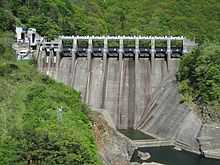Narude Dam
From Wikipedia, the free encyclopedia
| Narude Dam | |
|---|---|
 Downstream face | |
 | |
| Country | Japan |
| Location | Toyama/Gifu Prefecture |
| Coordinates | 36°21′00.31″N 136°52′29.72″E / 36.3500861°N 136.8749222°ECoordinates: 36°21′00.31″N 136°52′29.72″E / 36.3500861°N 136.8749222°E |
| Purpose | Power |
| Status | Operational |
| Construction began | 1950 |
| Opening date | 1952 |
| Dam and spillways | |
| Type of dam | Gravity |
| Impounds | Shō River |
| Length | 190 m (620 ft) |
| Height | 53.2 m (175 ft) |
| Dam volume | 103,000 m3 (135,000 cu yd) |
| Spillway type | Crest overflow, 8 tainter gates |
| Reservoir | |
| Total capacity | 9,709,000 m3 (7,871 acre·ft) |
| Active capacity | 3,186,000 m3 (2,583 acre·ft) |
| Catchment area | 762.3 km2 (294.3 sq mi) |
| Surface area | .62 km2 (0.24 sq mi) |
| Normal elevation | 391.6 m (1,285 ft) |
| Power station | |
| Commission date |
Original: 27 November 1951 New: 20 March 1975 |
| Turbines |
Original: 2 x 18.5 MW Francis-type New: 1 x 60 MW Francis-type |
| Installed capacity | 97 MW |
The Narude Dam is a gravity dam on the Shō River about 22 km (14 mi) south of Nanto on the border of Toyama and Gifu Prefectures, Japan. It was constructed between 1950 and 1952. The dam has an associated 97 MW hydroelectric power station which was built in two parts. The first part of the power station (37 MW) was commissioned in 1951 and the second part of the power station (60 MW) was commissioned in 1975. Of the nine dams on the Shō River it is the sixth furthest downstream.[1]
See also
- Akao Dam – downstream
- Tsubawara Dam – upstream
References
- ↑ "Hydroelectric power plantarude, Shinsei out" (in Japanese). Suiryoku. Retrieved 16 July 2013.
| Wikimedia Commons has media related to Narude Dam. |
| |||||
This article is issued from Wikipedia. The text is available under the Creative Commons Attribution/Share Alike; additional terms may apply for the media files.